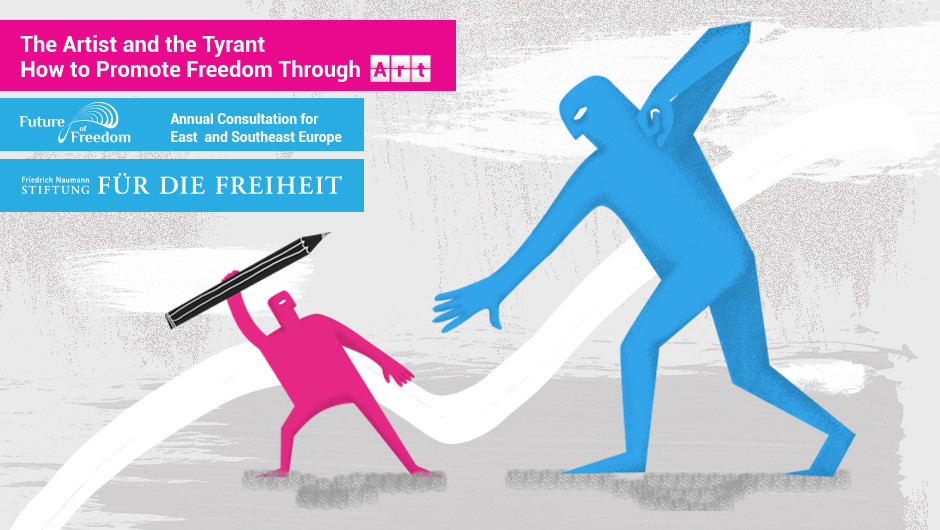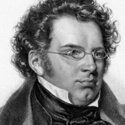The Artist and the Tyrant – How to Promote Freedom Through Art?

For centuries, freedom-loving people confined themselves to fight raw power and the abuse of authority either by bloody revolutions or by the pen using words only. The pen can be a powerful means to fight for rights and freedoms. Words can be written down or spoken to audiences and/or in private. But not only words were employed to criticize government action and injustice, often selected metaphors, humour, comedy, satire, ridicule and sarcasm were used to show to the ruling the discontent of the ruled.
In today’s world where constitutional democracy, open societies and civic liberties have come under renewed pressure by various authoritarian counter models, some of them economically successful but most invoking the nation, the ethnic group or religious affiliation, freedom loving people are again severely challenged. Authoritarian and hybrid regimes exert control of the media and constrain the public space for open debate and conversations. Those who dare to critique the ruling are persecuted and severely punished. Also today, contemporary tyrants do not take kindly public criticism. Courageous citizens criticizing or mocking tyrants in public often risk losing life, liberty and property. And again comedy and satire are often the only means to show discontent and confront the ruling with the opinions of the suppressed.
But even in democracies and semi-democracies, communicating our liberal values, convictions and ideas can be challenging. Here it is our brain-heavy disposition which sometimes prevents us from reaching a larger audience. Most civic education for adults in the world is mainly based on cognitive approaches to influence understanding, provide information and ultimately change behaviour of their target audiences. Facts, logic and reasoning are the ingredients of most successful adult education efforts. Debates and public discussion are at the heart of most programs.
However, in the time of fake news, strategic disinformation and aggressive propaganda, that seems, in general, a very welcome phenomenon, reasoning has fallen out of favour with large segments of the public. Intuition comes first, strategic reasoning second[1]. Especially populist politicians, regardless of their political leanings and persuasion, are quite successful in mobilizing audiences and voters through very emotional avenues and thereby, instead of touching the mind, reach the hearts and the feelings of their supporters and the wider public. Their approach is based on modern brain research which says “don’t talk about ideas any more, don’t talk about policies and programs, what really matters is manipulating the emotions of the people”.
[1] Haidt, Jonathan – The righteous mind. Why good people are divided by politics and religion, 2012
“Some people come into our lives, leave footprints on our hearts, and we are never the same”

Many liberals believe that “the facts will set you free”. If only one can get all the facts or the truth out there in the public eye, then every rational person will reach the right conclusions. Since human beings are basically rational persons who know their interest and behave in a way to promote their interest, liberal educators present their analyses, reports and messages. This can be called the “rationalist delusion”. It is the idea that reasoning is our most noble attribute, one that makes us like the gods (Plato). Many rationalists believe that the ability to reason well causes good behaviour that people who reason well are also likely to act morally. This is a vain hope. Human brains don’t work that way. Behavioural economics and psychology research has shown that humans do not process information or make decisions in a rational, exhaustive or computational manner.
The standard approaches of civil educators are to involve people in discussions and exchanges which are based on a cognitive path and a rational understanding of their realities. The formats used are often top-down and with a low level of interaction with the participants such as public lectures, panel and podium discussions by experts, seminars and conferences. Q&A sessions are often the maximum of engagement, and often the questions are limited to the loudest voices in the room. Many participants leave these engagements without ever having said a word.
In recent years many organizations have experimented with formats concentrating on the role of the arts, freedom of expression and how to use the arts to show discontent with the ruling. Deutsche Welle (DW), for instance, has called into action a platform called “Art of Freedom. Freedom of Art”, which is mainly about freedom of expression and the fight against censorship. The Human Rights Foundation (HRF) has created its “Art in protest” series, consisting of international exhibitions and events featuring artists whose work responds to injustice and oppression. HRF believes that art can provide space for the marginalized. Both approaches challenge boundaries imposed by repressive regimes and want to raise public awareness.
We want to a go a step further and develop concrete proposals for non-artists to use artistic means and media for political education for freedom. It is in this light that the Regional Office for East and Southeast Europe of the Friedrich Naumann Foundation for Freedom (ESEE) has decided to hold the annual consultation on the “Future of Freedom” on the theme: “The Artist and the Tyrant – How to Promote Freedom Through Art?”. The Consultation will take place in the city of Tbilisi, Georgia from September 20 to 23, 2018. The main aims of the Consultation are as follows:
- To jointly learn about ways of promoting freedom, using different art forms and conveying our messages with humour, irony and a certain detachment;
- To analyse and debate the effectiveness of creative engagements;
- To identify new options for promoting liberal ideas in oppressive environments and encourage civic engagement;
- To debate and discuss alternatives to the accepted contemporary instruments and methods of adult political education and learning.
The culture of freedom needs human beings, who love freedom, who value integrity, uprightness and who carry their culture with their own life into the future. We aim to produce a number of new formats and activity guidelines for education and civic action that can be used by our partners in the region for their outreach and advocacy programs to promote freedom and liberal values in East and Southeast Europe.
The Consultation will have 5 different working groups on the following topics: music, visual arts, film (video and television), language, performance arts. Please see our creative inspiration for the working groups below.
Participation is not an empty phrase to us. Participation lies at the heart of a successful democracy, and our liberal desire to create spaces where an individual is free to pursue and advance his or her dreams, thoughts and ideas. This is the type of environment we want to create at the Future of Freedom consultation. As is customary with all the “Future of Freedom” events, open formats and technologies will be used to ensure a maximum level of involvement and ownership by all participants. In the past, we experimented successfully with two open spaces (Istanbul and Bucharest) and a hybrid format of “talk and visit” (Kharkiv). For our Tbilisi event, we will use a mix of traditional and creative workshop formats with discussions, working groups and encounters with Georgian arts and civil society communities. The programme will also include visits to local educational arts establishments and other interesting activities.